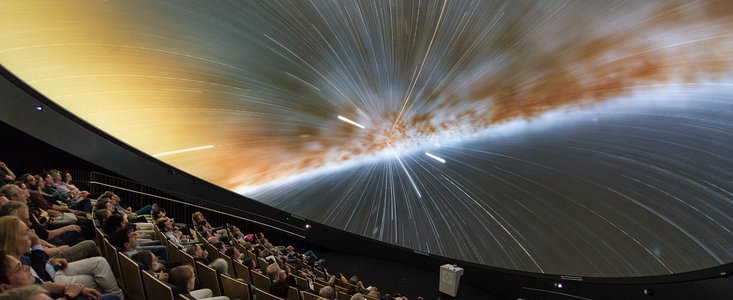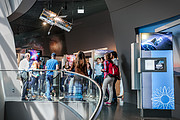Announcement
Exciting Autumn Programme at the ESO Supernova
The latest range of planetarium shows, tours and events available from October to December
3 September 2018
The ESO Supernova team have been working hard to prepare the final programme for 2018, which includes exciting events and shows for our Planetarium & Visitor centre. We are delighted to announce that our October–December programme is now available online. Featuring the latest ESO Supernova activities, the programme contains all you need to know about our forthcoming planetarium shows, guided tours and educational workshops. It also features special public events such as science talks, and much more.
Since its official inauguration on 26 April 2018, the ESO Supernova Planetarium & Visitor Centre has entertained and educated over 30 000 visitors with its range of captivating activities. The programme of shows, tours and events at the ESO Supernova changes every three months, giving audiences the chance to experience new aspects of astronomy with each visit. With the latest version of the programme, we are looking forward to welcoming even more visitors to the centre. All the activities in this programme are free — visitors just need to book in advance.
This programme features a new addition to the exciting library of planetarium shows screened in our state-of-the-art digital planetarium. The Planets, a show co-produced by ESO, will take you on a voyage to our cosmic neighbours through the eyes of space probes, to experience these worlds just as the space travellers of the future will. The Sun, Our Living Star featured at the end of our previous programme, and will now take a spot as one of our main shows from October to December. The new show is an immersive ESO fulldome experience directed by talented Greek filmmaker Theofanis Matsopoulos.
An exciting array of one-off special events will also be held, one highlight being a talk by Suzanna Randall, trainee astronaut and ESO astronomer, who will take visitors on a journey through the cosmos. Kaluoka’hina: The Enchanted Reef is a family show from our Media Partners Softmachine which follows the story of two fish on a mission to touch the Moon. There will be another chance to see Reaching New Heights, which featured in our first programme, as well as the regular The sky next month talks.
Our new exhibition LASERS | LIGHT | LIFE will be available from November. Designed by the Faculty of Physics of the Ludwig-Maximilians-Universität München (LMU), this stunning display provides insights into laser technology, from its invention in 1960 to its use today. As well as highlighting the functioning and development history of lasers, their role in science fiction and visionary possibilities for its application, the show presents fascinating areas of basic research carried out at the LMU and at the Max Planck Institute of Quantum Optics in Garching.
A printed version of the October–December programme will be available in the coming weeks, and will be distributed to various tourism outlets, hotels, and other partners as well as being available in the ESO Supernova itself. To see the full range of activities on offer at the ESO Supernova and to book a place at any of these exciting activities, follow this link, and explore the marvels of the Universe from here on Earth!
More Information
The ESO Supernova Planetarium & Visitor Centre
The ESO Supernova Planetarium & Visitor Centre is a cutting-edge astronomy centre for the public and an educational facility, located at the site of the ESO Headquarters in Garching bei München. The centre hosts the largest tilted planetarium in Germany, Austria and Switzerland and an interactive exhibition, sharing the fascinating world of astronomy and ESO to inspire coming generations to appreciate and understand the Universe around us. All content is provided in English and German and entrance is free, but requires prior booking. For more details visit: supernova.eso.org
The ESO Supernova Planetarium & Visitor Centre is a cooperation between the European Southern Observatory (ESO) and the Heidelberg Institute for Theoretical Studies (HITS). The building is a donation from the Klaus Tschira Stiftung (KTS), a German foundation, and ESO runs the facility.
ESO Supernova is proudly supported by: LOR Foundation, Evans & Sutherland, Sky-Skan and Energie-Wende-Garching.
KTS
The Klaus Tschira Stiftung (KTS) was created in 1995 by the physicist and SAP co-founder Klaus Tschira (1940-2015). It is one of Europe’s largest privately funded non-profit foundations. The Foundation promotes the advancement of the natural sciences, mathematics, and computer science, and strives to raise appreciation for these fields. The Foundation’s commitment begins in kindergarten and continue in schools, universities, and research facilities. The Foundation champions new methods of scientific knowledge transfer, and supports both development and intelligible presentation of research findings.
HITS
The Heidelberg Institute for Theoretical Studies (HITS gGmbH) was established in 2010 by the physicist and SAP co-founder Klaus Tschira (1940-2015) and the Klaus Tschira Foundation as a private, non-profit research institute. HITS conducts basic research in the natural sciences, mathematics, and computer science, with a focus on the processing, structuring, and analyzing large amounts of data. The research fields range from molecular biology to astrophysics. The shareholders of HITS are the HITS Stiftung, which is a subsidiary of the Klaus Tschira Foundation, Heidelberg University and the Karlsruhe Institute of Technology (KIT). HITS also cooperates with other universities and research institutes and with industrial partners. The base funding of HITS is provided by the HITS Stiftung with funds received from the Klaus Tschira Foundation. The primary external funding agencies are the Federal Ministry of Education and Research (BMBF), the German Research Foundation (DFG), and the European Union.
ESO
ESO is the foremost intergovernmental astronomy organisation in Europe and the world’s most productive ground-based astronomical observatory by far. It has 15 Member States: Austria, Belgium, Czechia, Denmark, France, Finland, Germany, Italy, the Netherlands, Poland, Portugal, Spain, Sweden, Switzerland and the United Kingdom, along with the host state of Chile and with Australia as a strategic partner. ESO carries out an ambitious programme focused on the design, construction and operation of powerful ground-based observing facilities enabling astronomers to make important scientific discoveries. ESO also plays a leading role in promoting and organising cooperation in astronomical research. ESO operates three unique world-class observing sites in Chile: La Silla, Paranal and Chajnantor. At Paranal, ESO operates the Very Large Telescope, the world’s most advanced visible-light astronomical observatory and two survey telescopes. VISTA works in the infrared and is the world’s largest survey telescope and the VLT Survey Telescope is the largest telescope designed to exclusively survey the skies in visible light. ESO is a major partner in ALMA, the largest astronomical project in existence. And on Cerro Armazones, close to Paranal, ESO is building the 39-metre Extremely Large Telescope, the ELT, which will become “the world’s biggest eye on the sky”.
Links
- The ESO Supernova online programme
- The ESO Supernova website
- ESO Supernova fact sheet (PDF)
- Support ESO Supernova
Contacts
Tania Johnston
ESO Supernova Coordinator
Garching bei München, Germany
Tel: +49 89 320 061 30
Email: tjohnsto@eso.org
Oana Sandu
Community Coordinator & Communication Strategy Officer
ePOD
Tel: +49 89 320 069 65
Email: osandu@partner.eso.org
About the Announcement
| Id: | ann18063 |



